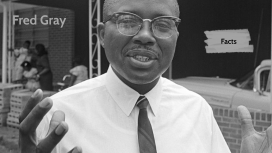Gray and Yellow Modern Project Presentation
Transcript: Gray and Yellow Modern Project Presentation An insightful overview of modern design principles using gray and yellow aesthetics. Conclusion This presentation encapsulated the project by highlighting its purpose, design inspirations, and sustainability efforts. The vision is to create a modern space that harmonizes with its environment while addressing the needs of the community. Sustainability Considerations Evaluating the project's commitment to sustainable practices and its impact on the environment and community. Energy Efficiency Measures Implementation of advanced technologies to minimize energy consumption, including renewable energy sources and smart systems. Waste Reduction Strategies "Questions are the engines of intellect." - Anonymous This session invites participants to share their thoughts and inquiries, fostering a collaborative discussion that enhances understanding and clarity. Adoption of practices aimed at minimizing waste generation throughout the project lifecycle, including recycling and upcycling initiatives. Community Impact and Engagement Strategies employed to involve the local community in sustainability efforts, fostering a sense of ownership and responsibility. Architectural Features Encouraging Audience Engagement Traditional Features Innovative Design Elements In contrast, traditional architectural features rely on established styles and materials, emphasizing symmetry, historical references, and durability. These elements often prioritize aesthetics over modern functionality, appealing to a sense of nostalgia and cultural heritage. This side focuses on innovative design elements that incorporate modern technology, unique shapes, and sustainable practices to enhance functionality and user experience. Features like smart home systems and flexible spaces are emphasized, showcasing a departure from conventional designs. Sustainable Materials Introduction This project aims to redefine modern living spaces by integrating sustainable practices and innovative design. Throughout the presentation, key aspects such as project goals, design inspiration, materials, and sustainability considerations will be discussed. The project incorporates eco-friendly materials such as reclaimed wood, recycled metal, and low-VOC paints, ensuring minimal environmental impact while maintaining high aesthetic standards. Enhancing User Experience Materials and Textures Careful selection of textures, including smooth surfaces and organic patterns, creates a welcoming environment that enhances user comfort and promotes interaction. Durability and Maintenance Materials were chosen for their longevity, requiring minimal upkeep. Features such as water-resistant finishes and robust construction methods ensure durability and reduce long-term maintenance needs. Project Name and Location The project is titled 'Gri ve Sarı Modern Project' and is located in the heart of Istanbul, Turkey. This strategic location is chosen for its accessibility and vibrant urban environment, making it an ideal setting for the intended development. Purpose and Goals The primary purpose of the project is to create a sustainable living space that integrates modern design with the needs of its residents. Goals include promoting community interaction, enhancing quality of life, and minimizing environmental impact. Project Overview Nature-inspired aesthetics Target Audience and Users Contemporary architectural styles Design Inspiration The target audience includes young professionals, families, and retirees seeking a modern and sustainable lifestyle. This diverse user base is essential to fostering a vibrant community. Color Palette The selected color palette consists of carefully chosen hues that evoke specific emotions and enhance the overall aesthetic of the project. Each color plays a vital role in creating an inviting atmosphere, reflecting the project's objectives and connecting with the target audience. Cultural heritage influences Key Stakeholders Involved Feedback-driven design process Key stakeholders in this project include urban planners, architects, local government representatives, and community organizations. Their collaboration is crucial for the project's success and alignment with community values.

















